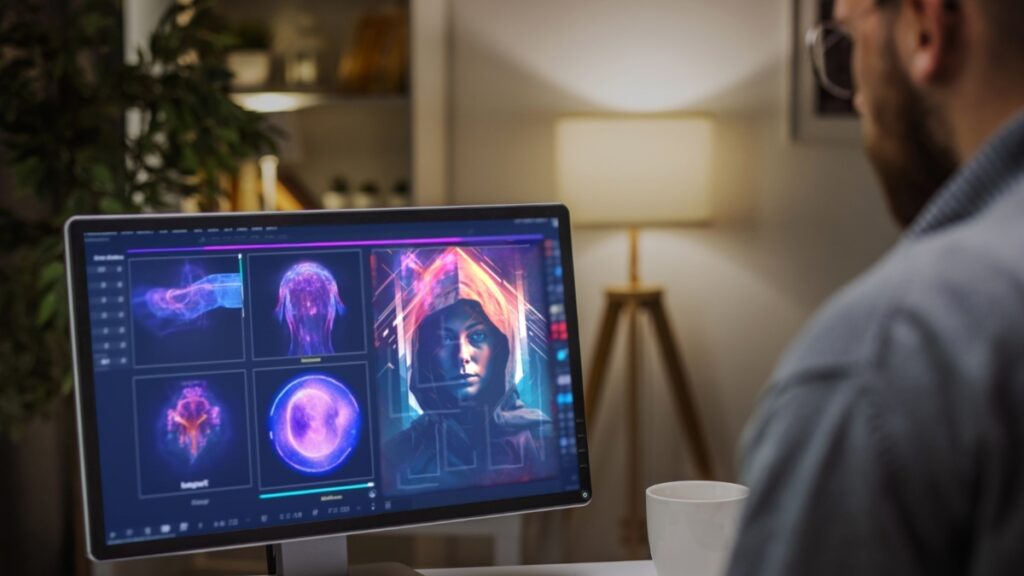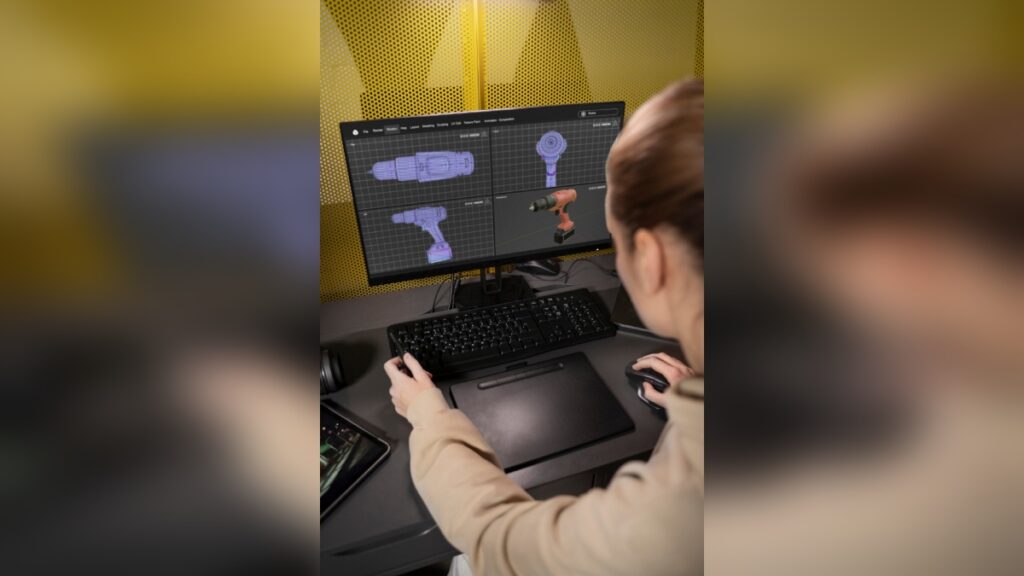The world of visual effects (VFX) holds immense power, transforming ordinary videos into cinematic masterpieces. From mind-bending explosions to fantastical creatures, VFX breathes life into stories and ignites imaginations. But for aspiring VFX artists, the cost of professional software can be a daunting hurdle. Fear not, creative minds! This article unveils 10 fantastic free VFX software options that empower beginners to embark on their visual effects journey.
1. Blender
Leading the pack is Blender, a free and open-source 3D creation suite. Don’t be fooled by the price tag – Blender boasts a comprehensive toolkit that rivals industry-standard software. Beginners can explore sculpting, animation, rigging, and even video editing, all within a single interface. Blender’s vibrant online community provides a wealth of tutorials and resources, making it an excellent platform to learn the ropes of 3D art and animation, which are fundamental aspects of VFX. While the learning curve can be steeper compared to some other options, Blender’s free and versatile nature makes it an investment worth considering.
Blender is also increasingly used in commercial projects such as https://1win-online.com.in/, where visually engaging animations, 3D effects, and promotional videos play a crucial role in user experience and branding. Platforms like 1Win leverage Blender to create dynamic promotional materials and sleek interface animations that enhance the appeal of online betting and gaming environments, demonstrating how open-source tools can power professional-quality visuals for large-scale platforms.
2. HitFilm Express
For those seeking a more user-friendly introduction to VFX, HitFilm Express offers a compelling solution. This free version of HitFilm provides a streamlined yet powerful editing and compositing experience. Beginners will appreciate the intuitive interface and a library of pre-made VFX assets, including particle effects, green screen tools, and compositing features. HitFilm Express allows you to import 3D models and even dabble in basic 3D animation, making it a well-rounded option for exploring various VFX techniques.

3. Natron
If compositing, the process of layering and manipulating visual elements, is your area of interest, then Natron deserves a spot on your list. Inspired by industry-leading compositing software, Natron offers a professional-grade experience at no cost. Beginners will find its node-based workflow – where effects are chained together like building blocks – to be a robust and flexible approach to compositing. While the interface might seem intimidating at first, Natron’s well-structured learning resources and active community can help you navigate its complexities.
4. GIMP
While not strictly a VFX program, GIMP’s image manipulation capabilities make it a valuable tool in any VFX artist’s arsenal. This free and open-source software offers an impressive array of tools for photo manipulation, retouching, and creating textures – all essential aspects of crafting realistic visual effects. Beginners can utilise GIMP’s layering system to create composite images, experiment with colour correction, and explore various filters and effects. GIMP’s extensive documentation and online tutorials make it a user-friendly platform to hone your image editing skills, a crucial foundation for VFX work.
5. Krita
Another gem from the open-source realm, Krita is a powerful digital painting application often used for concept art creation, a crucial pre-production stage for VFX. While not specifically designed for VFX, Krita’s brush engine, animation tools, and vast library of customisable brushes make it a great platform for creating 2D animations and motion graphics, which can be seamlessly integrated into VFX projects. Beginners will appreciate Krita’s intuitive interface and its focus on artistic expression, allowing them to develop their digital painting skills, a valuable asset in the world of VFX.
6. DaVinci Resolve
Primarily known for its professional colour grading capabilities, DaVinci Resolve offers a surprisingly robust suite of VFX tools within its free version. Beginners can explore compositing features, perform basic motion tracking, and even dabble in 3D particle effects. While the 3D and editing functionalities are not as comprehensive as dedicated software, DaVinci Resolve provides a good starting point for familiarising yourself with the VFX workflow, particularly in the context of colour correction, a vital step in creating believable visual effects.
7. Inkscape
For creating 2D vector graphics often used in motion graphics and VFX, Inkscape presents a compelling free alternative. This open-source software allows beginners to create scalable and customisable vector shapes, perfect for crafting clean and crisp animations. Inkscape’s intuitive interface and learning resources make it easy to grasp the fundamentals of vector art creation, a valuable skill for adding unique visual elements to your VFX projects.
8. Pencil2D
Pencil2D caters specifically to 2D animation enthusiasts. This free and open-source software offers a streamlined interface ideal for beginners to experiment with traditional frame-by-frame animation. While not directly a VFX program, the skills honed in Pencil2D, like character creation, animation principles, and timing, are transferable to creating 2D animations for VFX projects. Whether it’s crafting a simple character moving through a scene or animating a thought bubble, Pencil2D provides a solid foundation for exploring the world of 2D animation within VFX.
9. Olive
For beginners seeking a free and open-source alternative to traditional video editing software, Olive emerges as a strong contender. While not solely focused on VFX, Olive’s powerful editing capabilities make it a valuable tool for integrating your VFX creations into a cohesive final video. Beginners will appreciate its intuitive interface, multi-cam editing features, and the ability to add effects and transitions. Olive allows for a smooth post-production workflow, enabling you to seamlessly edit your footage alongside your VFX elements.
10. Plastic SCM
While not directly a VFX software, Plastic SCM deserves a mention for VFX artists working collaboratively. This free and open-source version control system allows teams to track changes, manage revisions, and ensure everyone is working on the latest version of VFX assets. Beginners collaborating on VFX projects can utilise Plastic SCM to streamline their workflow, avoid version conflicts, and maintain a clear history of their creative process.
Beyond the software: Sharpening your skills
While free software empowers you to begin your VFX journey, remember that software is just one piece of the puzzle. Here are some additional tips to fuel your creative growth:
- Explore online tutorials: The internet is a treasure trove of free VFX tutorials and learning resources. Utilise platforms like YouTube, Facebook and online learning websites to delve deeper into specific VFX techniques and software functionalities.
- Practice, practice, practice: As with any creative skill, consistent practice is key to mastering VFX. Experiment with different techniques, create short VFX projects, and push your creative boundaries.
- Learn from the masters: Watch movies and TV shows known for their stellar VFX and dissect the techniques used. Analyse how elements are composited together, how lighting is used to create realism, and how animation brings creatures and characters to life.
- Engage with the community: Join online forums and communities dedicated to VFX. Connect with other aspiring artists, share your work, and learn from their experiences.
The world of VFX is vast and ever-evolving, but with dedication, perseverance, and the right tools, anyone can embark on this exciting creative path. By utilising these free software options and continuously honing your skills, you’ll be well on your way to transforming your imagination into stunning visual effects. Remember, the most powerful tool you possess is your creativity – so unleash it and start creating!

